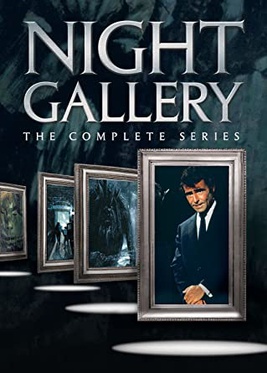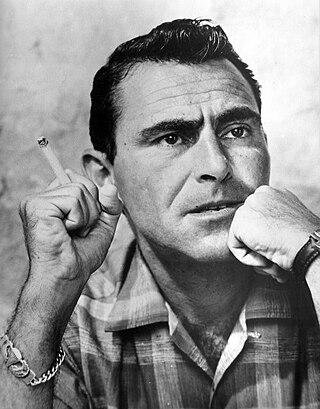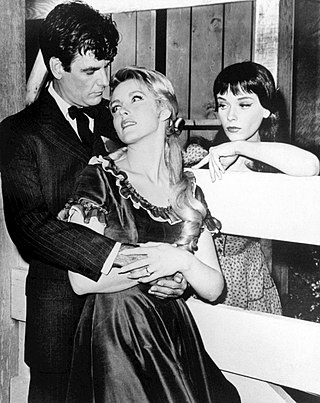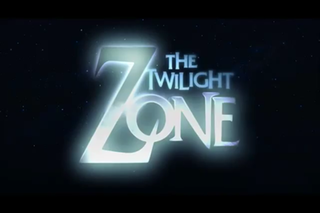Related Research Articles

The Twilight Zone is an American media franchise based on the anthology television series created by Rod Serling in which characters find themselves dealing with often disturbing or unusual events, an experience described as entering "the Twilight Zone". The episodes are in various genres, including fantasy, science fiction, absurdism, dystopian fiction, suspense, horror, supernatural drama, black comedy, and psychological thriller, frequently concluding with a macabre or unexpected twist, and usually with a moral. A popular and critical success, it introduced many Americans to common science fiction and fantasy tropes. The first series, shot entirely in black-and-white, ran on CBS for five seasons from 1959 to 1964.

Night Gallery is an American anthology television series that aired on NBC from December 16, 1970, to May 27, 1973, featuring stories of horror and the macabre. Rod Serling, who had gained fame from an earlier series, The Twilight Zone, served both as the on-air host of Night Gallery and as a major contributor of scripts, although he did not have the same control of content and tone as he had on The Twilight Zone. Serling viewed Night Gallery as a logical extension of The Twilight Zone, but while both series shared an interest in thought-provoking dark fantasy, more of Zone's offerings were science fiction while Night Gallery focused on horrors of the supernatural.

Rodman Edward Serling was an American screenwriter and television producer best known for his live television dramas of the 1950s and his anthology television series The Twilight Zone. Serling was active in politics, both on and off the screen, and helped form television industry standards. He was known as the "angry young man" of Hollywood, clashing with television executives and sponsors over a wide range of issues, including censorship, racism, and war.

"Where Is Everybody?" is the first episode of the American anthology television series The Twilight Zone and was originally broadcast on 2 October 1959, on CBS. It is one of the most realistic Twilight Zone episodes, as it features no supernatural elements and is based on fairly straightforward extrapolation of science.
"Walking Distance" is episode five of the American television series The Twilight Zone. It originally aired on October 30, 1959. The episode was listed as the ninth best episode in the history of The Twilight Zone by Time magazine.
"Escape Clause" is episode six of the American television anthology series The Twilight Zone. It is "the story of a strange contract between a mortal man and his most satanic majesty"; it originally aired on November 6, 1959, on CBS.
"A Nice Place to Visit" is episode 28 of the American television anthology series The Twilight Zone. The episode first aired on CBS on April 15, 1960. The title comes from the saying, "It's a nice place to visit, but I wouldn't want to live there."

"The Chaser" is episode 31 of the American television anthology series The Twilight Zone.
"A World of His Own" is episode thirty-six of the American television anthology series The Twilight Zone. It was the last episode of the show's first season and essentially comedic in tone. It originally aired on July 1, 1960, on CBS.
"The Night of the Meek" is episode 47 of the American television anthology series The Twilight Zone. It originally aired on December 23, 1960, on CBS. It was one of the six episodes of the second season which were shot on videotape in a short-lived experiment aimed to cut costs.

"The Obsolete Man" is episode 65 of the American television anthology series The Twilight Zone, starring Burgess Meredith as Romney Wordsworth, the accused, and Fritz Weaver as the Chancellor. It originally aired on June 2, 1961, on CBS. The story was later adapted for The Twilight Zone Radio Dramas starring Jason Alexander as Wordsworth.
"It's a Good Life" is the eighth episode of the third season of the American television series The Twilight Zone, and the 73rd overall. It was written by series creator/showrunner Rod Serling, based on the 1953 short story "It's a Good Life" by Jerome Bixby. The episode was directed by James Sheldon, and is considered by some, such as Time and TV Guide, to be one of the best episodes of the series. It originally aired on November 3, 1961. The episode was one of four from the original 1959 series which formed the basis of the 1983 film Twilight Zone: The Movie.
"I Am the Night—Color Me Black" is episode 146 of the American television anthology series The Twilight Zone. It originally aired on March 27, 1964 on CBS.

"In Praise of Pip" is an episode of the American television anthology series The Twilight Zone. In this episode, after learning that his soldier son has suffered a mortal wound in an early phase of the Vietnam War, a crooked bookie encounters a childhood version of his son.
"The Bewitchin' Pool" is the 156th and last episode of the first incarnation of the American anthology television series The Twilight Zone. It originally aired on June 19, 1964 on CBS.
The Twilight Zone is a nationally syndicated radio drama series featuring radio play adaptations of the classic 1959–1964 television series The Twilight Zone. The series was produced for the British digital radio station BBC Radio 4 Extra airing for 176 episodes between October 2002 and 2012. In the United States, it aired on nearly 200 radio stations including WCCO, KSL, KOA, WIND, XM Satellite Radio channel 163 and Sirius XM Book Radio. Most of the stations aired two episodes each week, usually on the weekends and many times back to back.

The Twilight Zone is an American fantasy science fiction horror anthology television series created and presented by Rod Serling, which ran for five seasons on CBS from October 2, 1959, to June 19, 1964. Each episode presents a standalone story in which characters find themselves dealing with often disturbing or unusual events, an experience described as entering "the Twilight Zone", often with a surprise ending and a moral. Although often considered predominantly science-fiction, the show's paranormal and Kafkaesque events leaned the show much closer to fantasy and horror. The phrase "twilight zone" has entered the vernacular, used to describe surreal experiences.

"Jess-Belle" is an episode of the American television science fiction and fantasy anthology series The Twilight Zone. In this episode, a young woman, whose name sounds like "Jezebel", spurned by the man she loves, becomes a witch in order to make him love her.

The Twilight Zone is a science fiction horror anthology television series, presented by Forest Whitaker. It is the second of three revivals of Rod Serling's original 1959–64 television series. It aired for one season on the UPN network, with actor Forest Whitaker assuming Serling's role as narrator and on-screen host. It was a co-production between Spirit Dance Entertainment, Trilogy Entertainment Group, Joshmax Productions Services, and New Line Television. It premiered on September 18, 2002, and aired its final episode on May 21, 2003.

Bonnie Jean Beecher, later known as Jahanara Romney, is an American activist and retired actress.
References
- ↑ Stanyard, Stewart T. (2007). Dimensions Behind The Twilight Zone: A Backstage Tribute to Television's Groundbreaking Series. Toronto, Ontario: ECW Press. p. 102. ISBN 978-1-55022-744-4 . Retrieved November 25, 2012.
- ↑ Brode, Douglas; Serling, Carol (2009). Rod Serling and The Twilight Zone: The 50th Anniversary Tribute. Fort Lee, NJ: Barricade Books. p. 203. ISBN 978-1-56980-358-5.
- ↑ Abbott, John (2009). Irwin Allen Television Productions, 1964-1970: A Critical History of Voyage to the Bottom of the Sea, Lost in Space, The Time Tunnel and Land of the Giants. McFarland. p. 23. ISBN 978-0-78644-491-5.
- ↑ Zicree, Marc Scott (1992). The Twilight Zone Companion. Silman-James Press. p. 425. ISBN 978-1879505094.